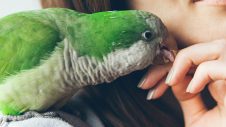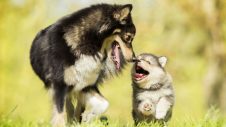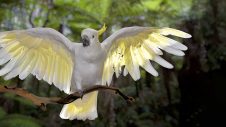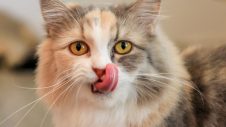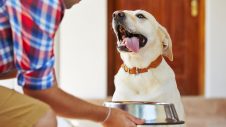Because there are many species of pet birds, there is no single diet that can be used. Some are seedeaters, some are nectar feeders (e.g. lorikeets), while some eat mainly fruit. So it is important to establish exactly what your bird can and will eat. The main mistake bird-keepers make is not feeding a balanced diet. For example, Vets often see cockatoos fed solely on sunflower seed, leading to obesity, fatty tumours and liver disorders. Poor nutrition is responsible for many common problems such as moulting disorders, respiratory disease, growth abnormalities, poor reproduction and egg binding and poor immune system. Rather than go into detail on protein, fat, carbohydrate, vitamin and mineral levels in diets, an owner needs to know how to feed the pet bird. Most pet outlets sell bird seed in the correct ratio of various seeds, but if this is fed as the sole diet, birds will develop vitamin and mineral deficiencies and protein will be too low.
There are two ways to achieve a balanced diet in seed-eating birds:
- Offer seed for 10-20 minutes twice a day or overnight then take it away and leave fresh vegetables (carrot, broccoli, silverbeet and spinach) and fruits (apple, pawpaw) and native nutrients. Avocado and cabbage may be toxic
- Feed commercially prepared pellets or diets, which are fully balanced in nutrients
- If birds absolutely refuse to eat new foods, at least ensure that a daily Vitamin supplement is given, and try offering a hand-rearing food along with the seed
Several factors to consider:
- Birds often fail to recognize new foods as something they can eat. Texture, shape and size of foods are more important to a bird than smell or taste (unlike cats and dogs). So new foods need to be introduced gradually, and at a place where the bird expects food to be
- Birds have different food requirements for breeding, moulting, growing and feeding young
- The main diet problem seen in seedeaters is Vitamin A deficiency, from having an all seed diet. This leads to many diseases commonly seen in pet birds
- Calcium is a very important mineral to birds and should always be available in some form e.g. cuttlefish, liquid drops in drinking water or calcium blocks
- Grit and water must be available at all times
- Always note if birds are eating daily. A sick bird will often pretend to eat and will stay at the food bowl without actually eating its food
With a good diet and a clean cage, at least 50% of bird diseases seen by use can be prevented.

 Greencross Vets
Greencross Vets 